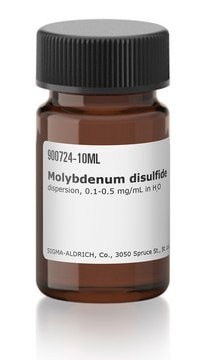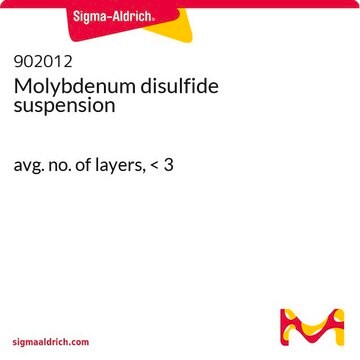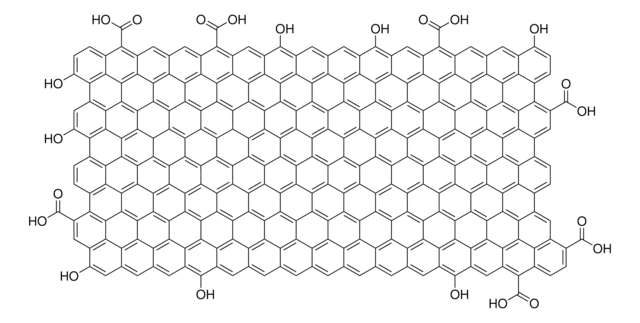901792
Molybdenum disulfide nanoplatelets
Synonym(s):
2D-Moly sulfide, 2D-Molybdenum disulfide, 2D-Molybdenum disulfide with nonionic surfactant, Moly sulfide
Sign Into View Organizational & Contract Pricing
All Photos(1)
About This Item
Linear Formula:
MoS2
UNSPSC Code:
12352302
NACRES:
NA.23
Recommended Products
description
50-1000 nm
thickness < 3 layers
form
nanoparticles
powder
Related Categories
General description
Molybdenum disulfide nanoplatelet (MoS2) is a two dimensional layered transition metal dichalcogenide (TMD) which has hexagonal layers of molybdenum atoms that are sandwiched between two layers of chalcogen atoms. It can be used as a non-linear optical material and as a reinforcing filler in polymeric composites.
Application
MoS2 based nanoplatelets can be used for a variety of applications such as optoelectronic, photonic, laser and solar hydrogen generation.
Owing to the thickness dependent physical and chemical properties, the transition metal dichalcogenide (TMD) based two dimensional (2D) nanomaterials have drawn significant attention recently. The atomically thin layers of MoS2 and WS2 represent important class of TMD based 2D-material and they find applications in photocatalysis, phtotovoltaics, gas sensing, lithium ion batteries, field effect transistors, spintronics etc.
Signal Word
Warning
Hazard Statements
Precautionary Statements
Hazard Classifications
Acute Tox. 4 Inhalation
Storage Class Code
11 - Combustible Solids
WGK
WGK 1
Flash Point(F)
Not applicable
Flash Point(C)
Not applicable
Choose from one of the most recent versions:
Certificates of Analysis (COA)
Lot/Batch Number
Don't see the Right Version?
If you require a particular version, you can look up a specific certificate by the Lot or Batch number.
Already Own This Product?
Find documentation for the products that you have recently purchased in the Document Library.
Customers Also Viewed
Solar hydrogen generation by nanoscale p-n junction of p-type molybdenum disulfide/n-type nitrogen-doped reduced graphene oxide.
Meng F, et al.
Journal of the American Chemical Society, 135(28), 10286-10289 (2013)
Laser light induced transformation of molybdenum disulphide-based nanoplatelet arrays.
Jagminas A, et al.
Scientific reports, 6(28), 37514-37514 (2016)
The influence of molybdenum disulfide nanoplatelets on the dispersion of nano silica in natural rubber composites.
Weng P, et al.
Applied Surface Science, 359(6), 782-789 (2015)
Exploration of Nanostructured Functional Materials Based on Hybridization of Inorganic 2D Nanosheets
The Journal of Physical Chemistry C, 118, 3847-3847 (2014)
Structure and catalytic properties of molybdenum sulfide nanoplatelets.
Elizondo-Villarreal N, et al.
Applied Catalysis A: General, 328(1), 88-97 (2007)
Our team of scientists has experience in all areas of research including Life Science, Material Science, Chemical Synthesis, Chromatography, Analytical and many others.
Contact Technical Service
